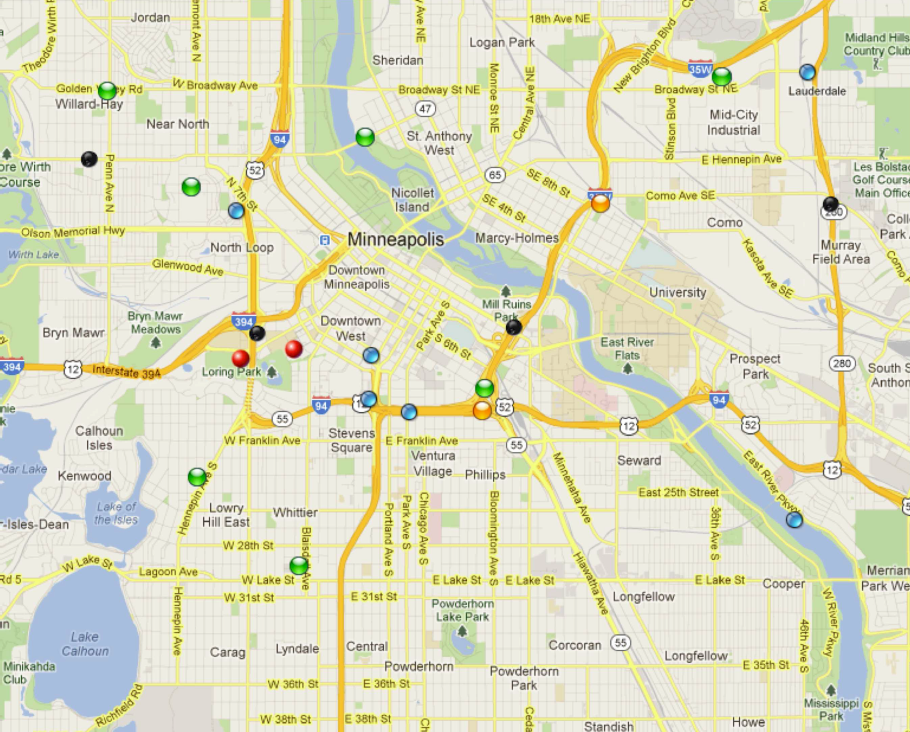Project Title: CAREER: Extensible Personalization of Spatial and Spatio-temporal Database Management Systems Project Award Number: IIS-0952977 PI Name: Mohamed Mokbel Department: Computer Science and Engineering Institution: University of Minnesota Address: 200 Union ST SE, Minneapolis, MN, 55455, USA Email: mokbel@cs.umn.edu URL: www.cs.umn.edu/~mokbel |
| PhD. 2016; Assistant Professor at University of California Riverside | |
| Title: SpatialHadoop: A Map-Reduce framework for Big Spatial Data | |
| PhD. 2015; Post-Doc at University of Virginia | |
| Title: Scalable Spatial Predictive Query Processing for Moving Objects | |
| PhD. 2014; Assistant Professor at Arizona State University | |
| Title: Database Systems Support for Collaborative Filtering Recommender Systems | |
| PhD. 2014; Researcher at Microsoft Research Asia | |
| Title: Towards Location-aware News Feeds and Recommendations | |
| PhD. 2011; Researcher at Microsoft Research | |
| Title: Extensible preference evaluation in database systems | |
| PhD 2011; Assistant Professor at Alexandria University, Egypt | |
| Title: Preference Queries Processing over Imprecise Data |
|
|
||
  SpatialHadoop
is an open source MapReduce framework with built-in
support for spatial data. It employs the MapReduce programming paradigm
for distributed processing to build a general purpose tool for large
scale analysis of spatial data on large clusters. Users can interact
easily with SpatialHadoop through a high level language with built-in
support for spatial data types and spatial operations. Existing spatial
data sets can be loaded in SpatialHadoop with the built in spatial data
types point, polygon and rectangle. SpatialHadoop is also extensible
and more data types can be added by users. In addition, the data sets
are stored efficiently using built-in indexes (Grid file or R-tree)
which speed up the retrieval and processing of these data sets. Users
can build an index of their choice with a single command that runs in
parallel on the machines in the cluster. Once the index is built, users
can start analyzing their data sets using the built in spatial
operations (range query, k nearest neighbor and spatial join). The
extensibility of SpatialHadoop allows users to implement more spatial
operations as MapReduce programs. For more information, please visit: "http://spatialhadoop.cs.umn.edu/" SpatialHadoop
is an open source MapReduce framework with built-in
support for spatial data. It employs the MapReduce programming paradigm
for distributed processing to build a general purpose tool for large
scale analysis of spatial data on large clusters. Users can interact
easily with SpatialHadoop through a high level language with built-in
support for spatial data types and spatial operations. Existing spatial
data sets can be loaded in SpatialHadoop with the built in spatial data
types point, polygon and rectangle. SpatialHadoop is also extensible
and more data types can be added by users. In addition, the data sets
are stored efficiently using built-in indexes (Grid file or R-tree)
which speed up the retrieval and processing of these data sets. Users
can build an index of their choice with a single command that runs in
parallel on the machines in the cluster. Once the index is built, users
can start analyzing their data sets using the built in spatial
operations (range query, k nearest neighbor and spatial join). The
extensibility of SpatialHadoop allows users to implement more spatial
operations as MapReduce programs. For more information, please visit: "http://spatialhadoop.cs.umn.edu/"
|
||
|
|
||
  RecDB
is an open source recommendation engine built entirely inside
PostgreSQL 9.2. RecDB allows application developers to build
recommendation applications in a heartbeat through a wide variety of
built-in recommendation algorithms like user-user collaborative
filtering, item-item collaborative filtering, singular value
decomposition. Applications powered by RecDB can produce online and
flexible personalized recommendations to end-users. An out-of-the-box
tool for web and mobile developers to implement a myriad of
recommendation applications. The system is easily used and configured
so that a novice developer can define a variety of recommenders that
fits the application needs in few lines of SQL. Crafted inside
PostgreSQL database engine, RecDB is able to seamlessly integrate the
recommendation functionality with traditional database operations,
i.e., SELECT, PROJECT, JOIN, in the query pipeline to execute ad-hoc
recommendation queries. The system optimizes incoming recommendation
queries (written in SQL) and hence provides near real-time personalized
recommendation to a high number of end-users who expressed their
opionions over a large pool of items. For more information, please
visit: "http://www-users.cs.umn.edu/~sarwat/RecDB/" RecDB
is an open source recommendation engine built entirely inside
PostgreSQL 9.2. RecDB allows application developers to build
recommendation applications in a heartbeat through a wide variety of
built-in recommendation algorithms like user-user collaborative
filtering, item-item collaborative filtering, singular value
decomposition. Applications powered by RecDB can produce online and
flexible personalized recommendations to end-users. An out-of-the-box
tool for web and mobile developers to implement a myriad of
recommendation applications. The system is easily used and configured
so that a novice developer can define a variety of recommenders that
fits the application needs in few lines of SQL. Crafted inside
PostgreSQL database engine, RecDB is able to seamlessly integrate the
recommendation functionality with traditional database operations,
i.e., SELECT, PROJECT, JOIN, in the query pipeline to execute ad-hoc
recommendation queries. The system optimizes incoming recommendation
queries (written in SQL) and hence provides near real-time personalized
recommendation to a high number of end-users who expressed their
opionions over a large pool of items. For more information, please
visit: "http://www-users.cs.umn.edu/~sarwat/RecDB/"
|
||
|
|
||
  |
||
|
|
||
  |
||